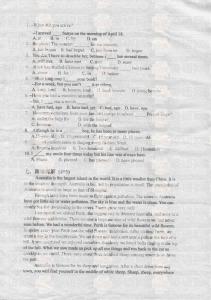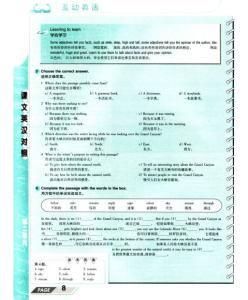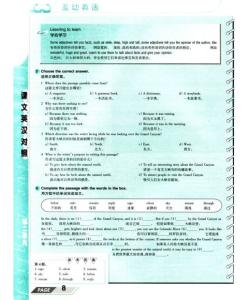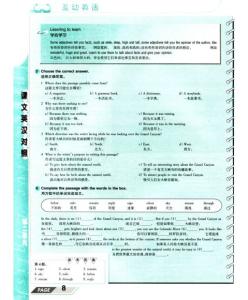对于英语的学习,除了背之外,还要多做练习!那么,对于初三英语的学习究竟要怎样有效的去做题呢?接下来不妨和小编一起来做份外研版初三上册英语Module 1测试试题,希望对各位有帮助!
外研版初三上册英语Module 1测试试题
Ⅰ. 词汇(共10分,每小题1分)
A)根据句意及所给汉语提示写出句中所缺单词。
1. There is going to be an interesting ________(讨论) about future life in our class tomorrow.
2. Mary opened the fridge and found that only two eggs ________(留下).
3. Look! The sun is ________(照耀) brightly in the sky.
4. Both Shanghai and Hangzhou are ________(在东边的) cities of China.
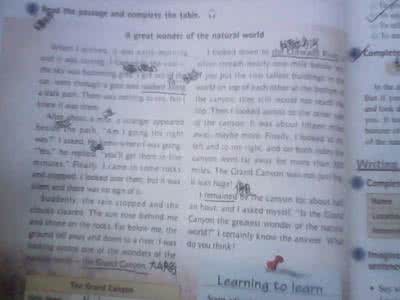
5. Mike likes the ________(灰色的) coat, but his mother doesn’t like it.
B)根据语境从方框中选出恰当的单词填空,有的需要变换形式。
clear, nature, sign, beside, loud
6. There is a big supermarket ________ the zoo.
7. Let’s go to the park after the rain stops and the clouds ________.
8. Bob, could you please turn down the radio? It’s too _______ _.
9. What do those road ________ mean, Dad?
10. How many kinds of animals and plants live in the ________ world?
Ⅱ. 单项选择(共15分,每小题1分)
从各题后所给的四个选项中选择可以填入空白处的最佳答案。
( )11. The great dam produces ______ electricity for people in this city.
A. a B. an
C. the D. 不填
( )12. Xiamen, Qingdao and Dalian are all beautiful cities ______ the coast of China.
A. in B. on
C. with D. below
( )13. The classroom is very ______ at noon, because all the students are sleeping.
A. clean B. large
C. crowded D. silent
( )14. There’re a lot of tall buildings on ______ sides of the street.
A. all B. both
C. each D. either
( )15. Tony can eat three bowls of noodles at a time, ______ he’s only seven years old.
A. if B. so
C. though D. because
( )16. —Your English is so good. Who taught you?
—No one. I learned it by ______.
A. I B. me
C. my D. myself
( )17. Zhang Jie’s homework is excellent except ______ mistakes.
A. few B. a few
C. little D. a little
( )18. Mrs Liu has two sons. One is a teacher and ______ is a doctor.
A. other B. another
C. the other D. others
( )19. —______ will the concert start?
—In about five minutes.
A. How far B. How long
C. How soon D. How often
( )20. The cloud over there ______ an elephant, doesn’t it?
A. looks like B. looks after
C. looks for D. looks at
( )21. —How big is your school?
—It is as ______ as your school.
A. big B. bigger
C. biggest D. the biggest
( )22. The students ______ more than 100 trees since last year.
A. plant B. planted
C. have planted D. will plant
( )23. When Susan got back home, her father ______ a newspaper in his bedroom.
A. reads B. is reading
C. read D. was reading
( )24. —Can you tell me ______?
—Next Tuesday.
A. when did Jenny go to Hainan B. when Jenny went to Hainan
C. when will Jenny go to Hainan D. when Jenny will go to Hainan
( )25. —I think our English teacher is very kind.
—______. And she is friendly to us.
A. Good idea B. I agree with you
C. It’s a pity D. Thank you
Ⅲ. 完形填空(共10分,每小题1分)
易读度 ★★☆☆☆
先通读下面短文,掌握其大意,然后从A、B、C、D四个选项中选择可以填入空白处的最佳答案。
Memorizing (记忆) class notes is a good way to learn English. But what is the 26 way for you to memorize class notes? The 27 is difficult to answer, because different people learn in different ways and there are really too many ways. It also has 28 to do with the material (材料) to be memorized.
I 29 a very good way to memorize class notes before. I typed the whole term’s hand-written notes into a computer. 30 it took a lot of time, it was a good way. It made me 31 the material again. This way of memorizing cl ass notes could also make me feel 32 , because it was an easy way. I just needed to start at the beginning of my notes and type to the end.
There are many other good ways to memorize class notes. 33 , you can underline (在……下面画线) the important parts of your notes using different coloured pens. When you review (复习) the notes, you will 34 more attention to these parts. You can 35 make an outline (概要) of your notes, and then you will understand each lesson better.
( )26. A. newest B. cheapest C. safest D. best
( )27. A. problem B. question C. phone D. door
( )28. A. something B. somebody C. nothing D. nobody
( )29. A. needed B. forgot C. missed D. used
( )30. A. Because B. Although C. Until D. When
( )31. A. worry about B. look up C. think about D. set up
( )32. A. nervous B. lucky C. relaxed D. bored
( )33. A. For example B. In fact C. As a result D. In the end
( )34. A. report B. pay C. lose D. receive
( )35. A. again B. already C. always D. also
Ⅳ. 情景交际(共5分,每小题1分)
根据对话内容从方框中选出能填入空白处的最佳选项补全对话,其中有两项多余。
A: Hi, Mike! (36)
B: I’m reading a book.
A: (37)
B: It’s about great wonders of the world. It’s very interesting.
A: Really? (38)
B: I think the Great Wall is the greatest. It’s very huge.
A: (39)
B: Sure, here you are.
A: When should I return it to you?
B: (40)
A: Thank you.
A. What is the book about?
B. Have you been to the Great Wall?
C. What are you doing there?
D. Can you lend the book to me?
E. You can return it to me next Sunday.
F. What do you think the greatest wonder is?
G. We can go there by bus.
 爱华网
爱华网
